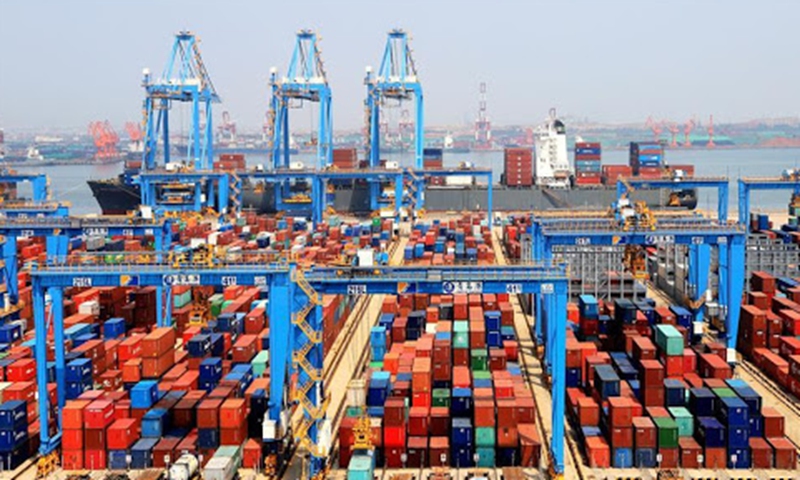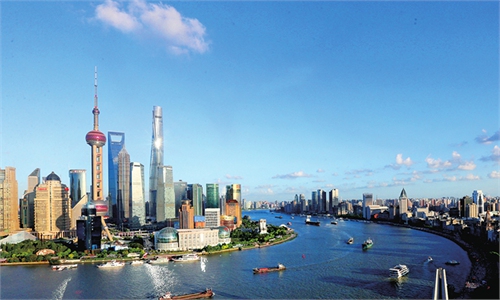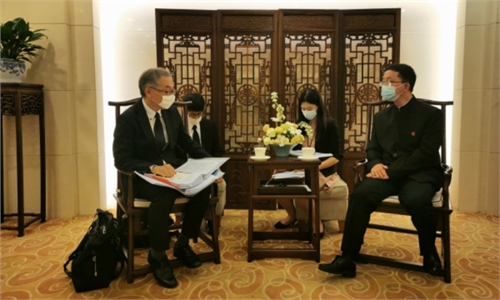
China economy Photo: Xinhua
Hours after China convened what has been seen as an unprecedented national video teleconference on stabilizing the economy, local governments spared no time to map out their missions in their respective regions, while the stock market also edged up after investors received a message of determination from the government to guide economic development back to a normal track after a marked slowdown.
The instant reaction also mirrors the market’s eagerness for clear policy instruction from the top level to stimulate economic growth, as many market entities feel a sense of uncertainty for future business prospects after their companies encountered headwinds like coronavirus lockdowns and Ukraine crisis, experts said.
At the teleconference, held by China’s State Council and reportedly included around 100,000 participants, Chinese Premier Li Keqiang stressed that the country might “grasp a time window” and strive to get the economy back on a normal track.
In particular, the premier stressed that stabilizing growth needs to be given a higher priority as the country focuses on ensuring market entities, employment and people's livelihoods.
Li also disclosed at the meeting that China will dispatch a task force to 12 provinces on Thursday to oversee local governments' policy implementation and supplemental measure rollout.
“One major objective of all those measures is trying to achieve a positive GDP growth in the second quarter, or even better at above the Q1 growth of 4.8 percent, as Q2 economic performance are crucial for China’s whole-year GDP growth,” Ye Qing, deputy head of the Hubei Provincial Statistics Bureau, told the Global Times.
The meeting marks a top--down resolution in safeguarding the momentum of the world’s second-largest economy, while presenting a unified spirit will help the country overcome the headwinds, analysts said.
Market response
Shortly after the meeting, some Chinese provinces are acting.
Wang Hao, governor of East China's Zhejiang Province, vowed to press forward with the province's implementation plans for the 33-item stabilization policy, ramp up local economy's return to a normal footing and make the province's due contribution to stabilizing the economy at large.
The Nanjing city government also convened a meeting on Wednesday to study allocation of work for stimulating the city economy. The meeting asked local departments to “go to all lengths” to achieve the city’s set economic targets.
Governor of the Hubei Province Wang Zhonglin also stressed on Wednesday that the central province will accelerate implementation of a series of infrastructure projects in energy, water facilities and transportation.
China’s stock markets edged up on Thursday, with the Shanghai Composite Index rising by 0.5 percent, while the Shenzhen market rose by 0.57 percent.
Several companies interviewed by the Global Times applauded the government’s determination and action to help domestic companies cope with the difficulties. Although many of them have seen a business slump in recent months, they still have confidence in a business rebound soon.
A manager with a logistic company based in Shanghai surnamed Zhao told the Global Times on Thursday that company business has dropped at least 50 percent in April year-on-year due to lockdown, but business revenue is likely to pick up by about 10 percent in May, compared with the previous month. Zhao's foreign trade company encountered a historic business loss of at least a million yuan this year.
According to Zhao, the growing complexity of the external environment including the US' Indo-Pacific strategy, the high inflation abroad and the rising interest rate of the dollar, is casting a shadow of uncertainty to foreign trade companies. But he still holds confidence and believes that the epidemic will be brought under control soon.
Liu Hongyuan, CEO of a compression socks maker and exporter Hangzhou Zhongzhi Industry Co, told the Global Times that he feels a mixture of uncertainty and confidence for the future.
“I have confidence in long-term development prospect of the sports industry (which boosts demands for our products), but currently our business pressure is heavy and I am a little bit anxious,” he said.
This feeling of uncertainty has arisen from diminishing purchasing power or willingness from overseas clients, which caused the company’s exports to drop compared with last year, he said.
He also told the Global Times that the company has benefited from the government’s VAT credit refund policy, and anticipated more support from the authorities. Zhao said that the authorities are encouraging banks to lend more to aid small enterprises.
Global Times



